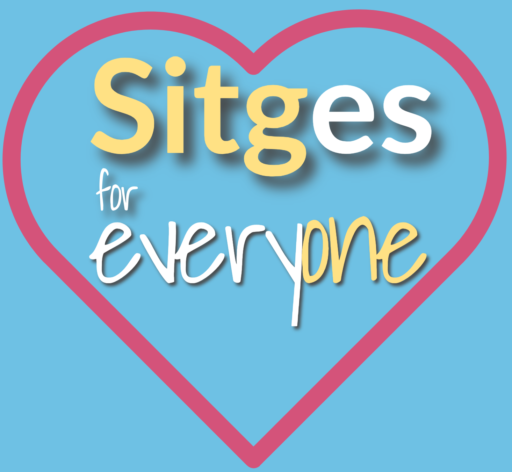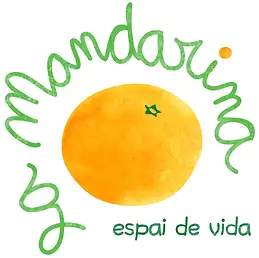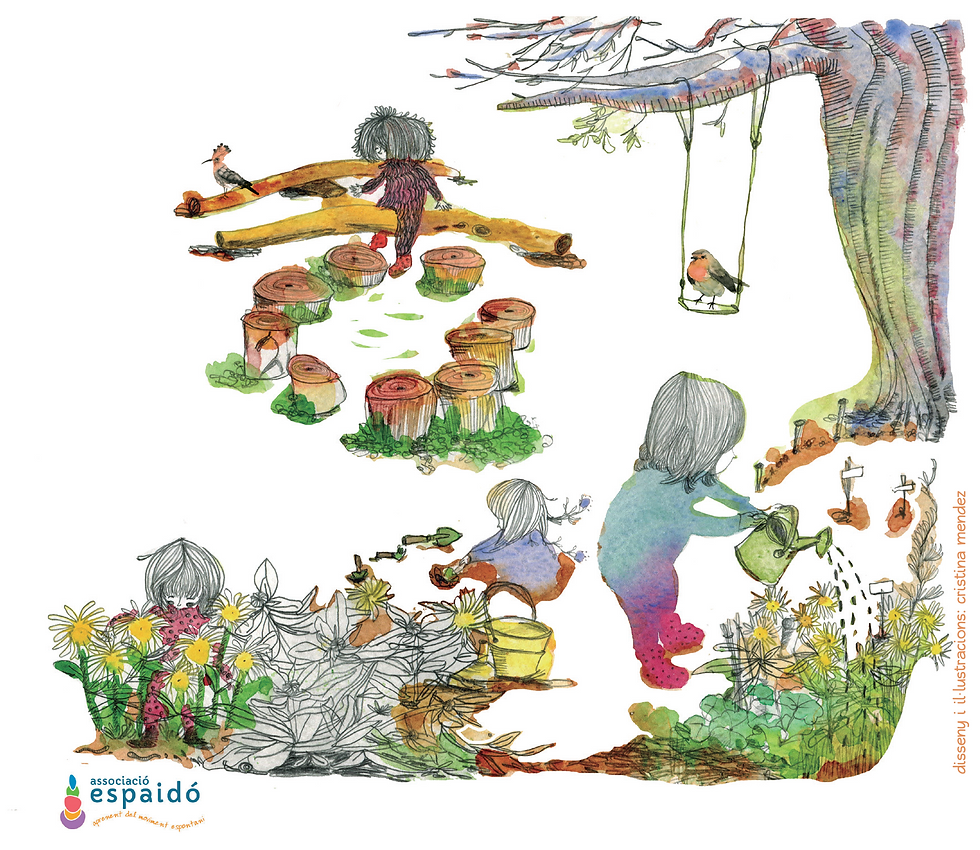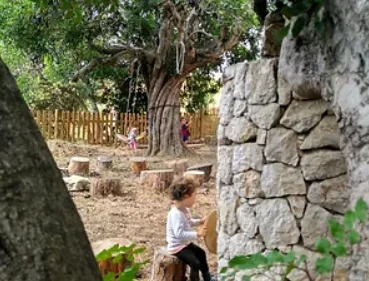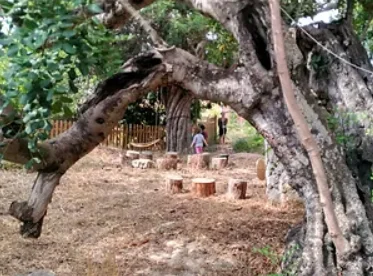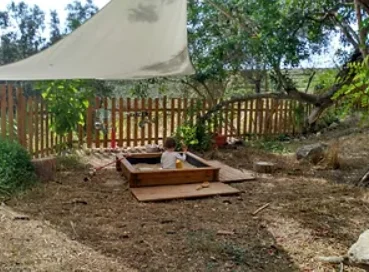Profile
La Mandarina Kindergarten Sant Pere de Ribes
At La Mandarina Kindergarten Sant Pere de Ribes, our fundamental philosophy is based on three pillars: Nature, Seitai and Living Education
Nature
Nature is the ideal framework for children. Living in nature every day allows children to run up and down, jump, climb trees, climb, swing, slide, play with earth, mud, sand , water, stones, leaves, grass, experience gravity, forces of nature, physics, feel the sun on their skin, air, wind, breeze, rain, smell the flowers, the wet earth, dry earth, breathe fresh air and more!
They will observe animals, insects, worms, birdsong, how they relate, how they fly, how they move; observe the changes of the seasons, the processes of nature, when the leaves fall, when it freezes, the first buds, when the flowers open, when the trees bloom, when the fruit comes out and we eat it. Nature is a great teacher, a great source of learning and stimulation, a luxury to be able to enjoy it.
At La Mandarina we have developed a project of wild edibles, aromatic and medicinal plants and fruit trees and shrubs with the help of the ethnobiologist Clara Gutiérrez. In addition, every day we go on excursions and also enjoy the forest in its wild state.
Seitai
Seitai, through observation, gives us very interesting tools to know the biological differences of each person, so that we can understand and respect them, and respect ourselves. So, just as one plant needs a lot of water and another very little, different sensitivities have different needs, neither better nor worse, just different. Understanding children helps us to accompany them through their learning better, without judging them.
Seitai gives us tools to free ourselves from tension, to be more authentic and creative, to regain health and vitality, and thus be able to accompany children with the vitality they need and through listening, intuition, communication with hands (Yuki) and movement, instead of adult reason and words.
One of the basic concepts of Seitai is Self-Regulation of the Body through Spontaneous Movement (Katsugen). Movement is life and spontaneous movement regenerates this life. The body seeks to be physically and mentally healthy and achieves it if it is allowed to. Seitai practices are very simple, by letting go you get your body to move spontaneously, regenerating itself, the body finds a way to move from its internal desire. Yuki, hand communication, helps the movement flow. Children do it spontaneously without giving it much importance.
Living Education
Living education is characterized by giving families a very important role in the growth of their children, a respect for the children’s vital needs and a loving accompaniment, without judgement, providing a safe, relaxed and rich environment so the child can fully develop according to their own rhythm and internal path.
The child’s learning starts from their own impulse and experimentation, without suggestions or directives from the adult. Children come into the world with great energy, curiosity, a desire to explore and learn, it is innate in the human being and is maintained if they are respected.
Practical Information
Ages: children between 1 and 3 years of age (under 1 year old will depend on the number of children in this age range in the group)
Hours: from 9 a.m. to 2 p.m
Calendar: We follow the school calendar from September to June, with local and regional holidays state holidays, winter and spring holidays and free days.
Interviews: we conduct an initial interview with parents to get to know us, where you tell us about your child. We will then hold a meeting at the end of the term to share our day-to-day observations. We will conduct interviews whenever there is a need to talk about a specific topic on the part of parents or chaperones. These interviews will be done without the presence of the child.
A typical Day:
The dynamics can change depending on the members of the group, the individual needs and those of the group, so these dynamics are indicative:
Arrival: From 9 o’clock, take a relaxed time to say goodbye to the child, whenever possible. We think it’s important to arrive between 9 and 9.30 to start the same dynamics together. If there is a child who always arrives later, it may be more difficult for him to make the transition because the others are already doing their own thing.
Breakfast: when the children arrive, they leave what they brought for breakfast in a basket. Between 9.30 and 10am we will prepare it together (whoever wants to) at the outside table (those who want to peel the mandarin, cut the banana, place the food on the plate etc) and have breakfast while singing “Nyam Nyam bon profit “. Water is always at your disposal. Breakfast will be on the table until we leave for the excursion around 11-11:30am.
Excursion: Around 11-11:30 a.m. we take a short trip around La Mandarina. Depending on the time of year, we will go around the vineyards looking for grapes, walnuts, almonds, pineapples, trunks, sticks, leaves… or we will investigate corners, look for logs to climb or make cabins. We often carry bags and take the opportunity to clean the forest by collecting the rubbish we find there.
If there are a lot of very small children, we may divide the group and the older ones go on a trip that can go further and climb, while the smaller ones stay to enjoy having the space to themselves or to rest or sleep.
Lunch: Around 12.30pm. We wash our hands, put the lunch on the table, each one has what he has brought, and once finished, we try to have each child pick up his plate and if he wants to wash it (depending on his maturing age, these are dynamics that we will do as we go along, without forcing them and from enjoying the sponge, the soap, the water, the heat of the water, place the plate in the drainer and that it remains upright, tidy. Everything can be very interesting as long as it is done from the perspective of enjoying, trying, imitating.
Farewell: Around 1.40pm we collect everything that is out of place while singing. At the end we sit on the log circle where we sing a song and end up singing “l’Adéu Adéu.” It is important that you arrive before 2pm (at 1.45pm or 1.50pm depending on how long your child needs to say goodbye in a relaxed manner and thus leave at 2pm on time.) We say goodbye in a relaxed way, recalling some anecdote of the day, or finding something to highlight (if it’s something that’s better to talk about more privately with the parents, we’ll find a way to pass it on but not in front of the child).
Map
Sorry, no records were found. Please adjust your search criteria and try again.
Sorry, unable to load the Maps API.
